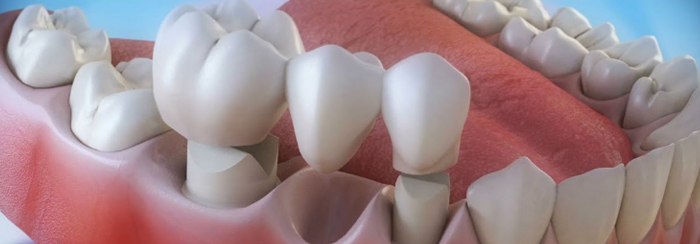Just How Long Does a Dental Bridge Last?
If you’re diligent with oral hygiene care, you’ll be pleased to know the answer!

Dental bridges consist of two or several dental crowns that are placed onto adjacent teeth (also known as abutments), with the artificial dental replacement (pontic) attached to the crowns on either end.
Before a person receives a dental bridge, they’ll have four main types of dental bridges to choose from, or that their dentist will recommend:
- Conventional dental bridges: the most popular option among patients, this type of dental bridge consists of a replacement tooth fixed to the anchoring crowns, which are fixed to the adjacent teeth.
- Implant-supported bridges: similar to the conventional dental bridge, this type of dental bridge instead is supported by a dental implant vs. the adjacent teeth. The advantage of this dental bridge is that it prevents loss of bone/jaw due to the dental implant component.
- Cantilever dental bridges: this type of dental bridge is typically used in cases where there is only one natural tooth available beside the missing tooth.
- Maryland bonded bridges: with this type of dental bridge, a metal framework is required in order to support the artificial replacement teeth.
While we talked about how to take care of your dental bridge in our previous blog article talked about the proper daily maintenance and care of dental bridges, it’s also good to be aware of how long these restorations can stay durable for
Can a dental bridge last a lifetime?
According to the Cleveland Clinic, dental bridges can last for at least five to seven years - but this jumps up to over 10 years provided the patient regularly visits their dental professional. Furthermore, the University of Rochester Medical Center stated that dental bridges have the potential to last a lifetime with good oral hygiene!
This means you’ll need to:
a) Adhere to twice-a-day cleaning using the proper tools and a proper technique to remove bacteria and debris from both the replacement teeth and natural teeth/ including underneath and between the bridge,
b) Try your best to avoid a diet that’s high in sugars or starchy foods as this will increase your risk for decay surrounding the bridge, which can compromise the restoration, and,
c) Avoid any aggressive habits that could put your bridge at risk for damage or wear (which includes biting down on hard objects, or using the teeth as tools).
When you think about it, you should already be doing most of this anyway to protect your natural smile - bridge or no bridge!
Have more questions about dental bridges?
Our Network of Preferred Provider Dentists in Ontario would be glad to help! Locate a Teeth First Dental Clinic nearest you today.